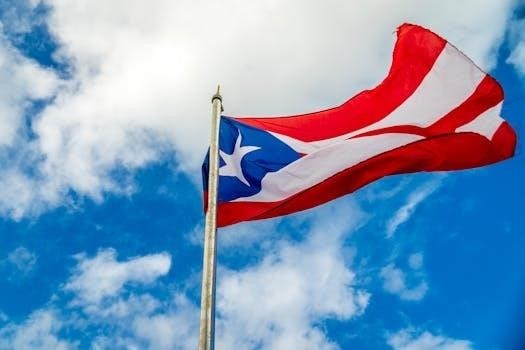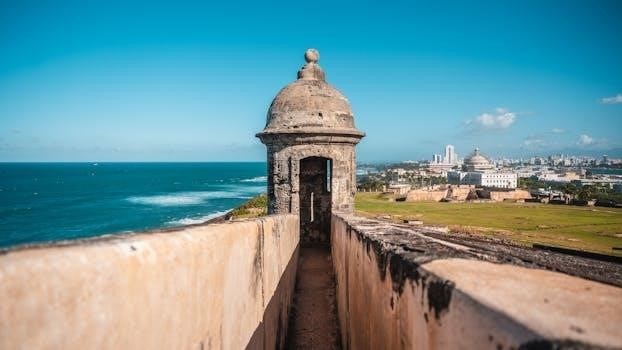Overview of “When I Was Puerto Rican”
When I Was Puerto Rican is Esmeralda Santiago’s acclaimed memoir detailing her formative years. It chronicles her journey from rural Puerto Rico‚ marked by both tenderness and domestic strife‚ to her adolescence in Brooklyn.
Autobiographical Nature of the Work
When I Was Puerto Rican distinguishes itself through its deeply personal and autobiographical narrative. Esmeralda Santiago crafts a compelling account of her own life‚ sharing intimate details of her childhood and adolescence. The memoir serves as a window into her experiences‚ offering readers a direct connection to her evolving identity. Santiago’s willingness to expose her vulnerabilities and triumphs establishes an authentic and relatable voice. This authentic portrayal allows the reader to experience Santiago’s journey firsthand‚ immersing them in the challenges and discoveries that shaped her. This personal approach is critical to the book’s impact‚ contributing to its critical acclaim and enduring popularity. The narrative style is deeply rooted in the author’s memories and reflections‚ making it a powerful testament to the human experience.
Esmeralda Santiago’s Childhood and Adolescence
Esmeralda Santiago’s memoir vividly depicts her childhood in rural Puerto Rico‚ characterized by a blend of warmth and hardship. Her narrative brings to life the sights‚ sounds‚ and flavors of her early years. Growing up amid the mango groves and the sounds of tree frogs at night‚ she experienced both tenderness and domestic conflict within her family. The book explores the challenges of poverty and the complexities of family dynamics‚ capturing the essence of her upbringing. Santiago’s adolescence marks a significant turning point as her family makes the move to Brooklyn. This transition from the familiar landscapes of Puerto Rico to the urban environment of New York City is a central theme in her story‚ highlighting the cultural adjustments and identity struggles she faces during her formative years as she learns what it means to be Puerto Rican in the United States.
Availability of the PDF Version
The PDF version of When I Was Puerto Rican is available through various online platforms. Readers can explore libraries and online booksellers for digital access to Esmeralda Santiago’s poignant memoir.
Platforms Offering PDF Downloads
Several platforms offer the opportunity to download the PDF version of When I Was Puerto Rican. These platforms include online libraries‚ digital bookstores‚ and potentially some educational resource websites. It’s crucial to verify the legitimacy and copyright permissions of these sources before downloading. Many online libraries provide access to digital versions of books‚ often requiring a library card or subscription. Digital bookstores‚ such as Amazon Kindle or Google Play Books‚ may offer the book for purchase as a PDF or in their proprietary format. Some educational websites may offer the PDF as a resource for students and educators‚ but users should always confirm the source’s credibility. Additionally‚ users should be cautious of websites offering free downloads‚ as they may infringe on copyright laws or contain malware. Always prioritize legal and reputable sources when seeking a PDF of this acclaimed memoir by Esmeralda Santiago.
Legality and Copyright Considerations
Downloading and distributing copyrighted material‚ such as the PDF of When I Was Puerto Rican‚ without permission from the copyright holder is illegal. Copyright law protects the author’s and publisher’s rights to control how their work is reproduced and shared. Unauthorized downloads infringe on these rights and can result in legal consequences‚ including fines and lawsuits. Legitimate ways to access the book include purchasing it from authorized retailers‚ borrowing it from a library‚ or subscribing to a digital reading service. Be wary of websites offering free PDF downloads‚ as these sources often operate illegally and may expose users to malware or viruses. Supporting authors and publishers by purchasing their work ensures they can continue creating valuable content. Always respect copyright laws and seek legal avenues to access literary works. Remember‚ ethical access to literature benefits everyone.

Themes and Literary Analysis
When I Was Puerto Rican explores themes of cultural identity‚ displacement‚ and family dynamics. Santiago’s memoir provides rich material for literary analysis‚ examining language‚ education‚ and personal growth within a changing cultural landscape.
Cultural Identity and Displacement
Esmeralda Santiago’s “When I Was Puerto Rican” poignantly portrays the complexities of cultural identity and the profound impact of displacement. The narrative vividly depicts her transition from the familiar landscapes and traditions of rural Puerto Rico to the unfamiliar urban environment of Brooklyn‚ New York. This relocation forces her to navigate the challenges of straddling two distinct cultures‚ grappling with questions of belonging and self-definition.
The memoir explores how her sense of self is reshaped by her experiences in America‚ as she confronts prejudice‚ language barriers‚ and the pressure to assimilate. Santiago masterfully illustrates the internal conflict that arises from trying to reconcile her Puerto Rican heritage with her new American identity. Her story resonates with anyone who has experienced the challenges of adapting to a new culture and the struggle to maintain their cultural roots. The narrative delves into the nuances of being caught between two worlds‚ examining the push and pull between embracing a new identity and preserving one’s cultural heritage.
Family Dynamics and Domestic Strife
“When I Was Puerto Rican” offers a raw and intimate glimpse into the complexities of family dynamics and the realities of domestic strife within Esmeralda Santiago’s upbringing. The memoir portrays a household filled with both love and tension‚ where the warmth of familial bonds is often overshadowed by the challenges of poverty‚ parental conflict‚ and the everyday struggles of raising a large family.
Santiago unflinchingly depicts the volatile relationship between her parents‚ highlighting the impact of their constant disagreements and eventual separation on her and her siblings. The narrative reveals the emotional toll that domestic strife takes on the children‚ forcing them to navigate a chaotic and unstable home environment. Despite the hardships‚ the memoir also showcases the resilience and love that bind the family together‚ demonstrating their ability to find moments of joy and connection amidst the turmoil. The author beautifully captures the nuances of her family relationships‚ portraying them with both honesty and empathy.
Language and Education
In “When I Was Puerto Rican‚” language and education emerge as pivotal themes‚ deeply intertwined with Esmeralda Santiago’s personal development and cultural assimilation. The memoir vividly illustrates the challenges and triumphs she experiences as she navigates the transition from speaking primarily Spanish in Puerto Rico to learning English in New York City. Language becomes a symbol of both connection and separation‚ representing her ties to her heritage and her struggle to adapt to a new cultural landscape.
Santiago’s educational journey is marked by both obstacles and opportunities. She encounters prejudice and discrimination due to her limited English proficiency‚ but she also discovers the power of education to empower herself and transcend her circumstances. Her determination to master English and excel in her studies reflects her resilience and her desire to create a better future for herself. Ultimately‚ language and education become instrumental in shaping her identity and enabling her to bridge the gap between her two worlds.

Educational Resources and Study Guides
Comprehensive teaching units and diverse study guides exist for When I Was Puerto Rican. These resources offer lesson plans‚ reading questions‚ and analytical tools to aid in understanding the memoir’s themes.
Teaching Units and Lesson Plans
Teaching units designed for When I Was Puerto Rican offer educators a structured framework for exploring the memoir in the classroom. These resources often include detailed lesson plans‚ saving valuable preparation time. Lesson plans typically address key themes such as cultural identity‚ displacement‚ and language acquisition. They may also incorporate activities that encourage critical thinking and personal reflection on the text.
Furthermore‚ effective lesson plans often feature multimedia components‚ integrating audiobooks or excerpts from interviews with Esmeralda Santiago. This multifaceted approach enhances student engagement and comprehension. Teachers can utilize these resources to create a dynamic and enriching learning experience centered around Santiago’s powerful narrative. These units aim to provide a comprehensive exploration‚ fostering a deeper understanding.
Reading Questions and Analysis Tools
To facilitate a deeper engagement with When I Was Puerto Rican‚ various reading questions and analysis tools are available. These resources are designed to guide readers through the complexities of Esmeralda Santiago’s narrative‚ prompting critical thinking and thoughtful discussion. Reading questions often focus on key themes‚ such as cultural identity‚ family dynamics‚ and the challenges of adapting to a new environment.
Analysis tools may include character maps‚ plot diagrams‚ and thematic organizers‚ helping readers to dissect the novel’s structure and meaning. These resources encourage students to explore the author’s use of language‚ imagery‚ and symbolism. Ultimately‚ the goal of these tools is to empower readers to develop their own interpretations and appreciate the nuances of Santiago’s powerful and moving memoir. They serve as catalysts for thoughtful exploration.

Esmeralda Santiago’s Life and Works
Esmeralda Santiago‚ born in San Juan‚ Puerto Rico‚ is celebrated for her autobiographical works. Her writings often explore themes of identity‚ culture‚ and the immigrant experience‚ resonating with diverse audiences.
Santiago’s Biography
Esmeralda Santiago was born in San Juan‚ Puerto Rico‚ in 1948. Her early life was characterized by a vibrant cultural upbringing‚ set against a backdrop of domestic complexities and the challenges of poverty. At the age of thirteen‚ Santiago immigrated to the United States‚ specifically Brooklyn‚ New York‚ with her mother and siblings‚ marking a significant turning point in her life and shaping her future literary work.
Santiago’s experiences as a young immigrant‚ navigating a new language and culture‚ heavily influenced her writing. She pursued higher education‚ attending New York City College and later Harvard University. Her literary career blossomed with the publication of When I Was Puerto Rican‚ the first of her autobiographical trilogy‚ establishing her as a prominent voice in Latina literature. Santiago’s work continues to resonate with readers‚ offering profound insights into identity‚ displacement‚ and the power of resilience.
Other Notable Works by the Author
Beyond When I Was Puerto Rican‚ Esmeralda Santiago has authored several other significant works that explore themes of identity‚ cultural transition‚ and personal growth. Her autobiographical trilogy continues with Almost a Woman‚ detailing her experiences as she navigates adolescence and early adulthood in New York City‚ and concludes with The Turkish Lover‚ which recounts her journey of self-discovery through education and relationships.
Santiago’s fiction includes America’s Dream‚ a novel that delves into the complexities of domestic violence and the pursuit of a better life. She has also written children’s books‚ such as A Little Bit of Paradise‚ further showcasing her versatility as a writer. Through these diverse works‚ Santiago continues to offer compelling narratives that resonate with readers of all backgrounds‚ solidifying her place as a celebrated and influential author.

Critical Reception and Impact
When I Was Puerto Rican received widespread critical acclaim for its honest portrayal of cultural identity and displacement. It has significantly influenced Puerto Rican literature‚ giving voice to previously marginalized experiences.
Reviews and Literary Criticism
Literary critics have lauded When I Was Puerto Rican for its poignant and unflinching depiction of Esmeralda Santiago’s childhood. Reviews often highlight the memoir’s authenticity in portraying the complexities of cultural assimilation and the challenges faced by Puerto Rican immigrants in the United States. Critics appreciate Santiago’s vivid descriptions of her early life in Puerto Rico‚ contrasting the idyllic beauty with the harsh realities of poverty and domestic conflict.
Furthermore‚ the book’s exploration of identity formation‚ particularly the struggle to reconcile her Puerto Rican heritage with her American experience‚ has resonated with readers and critics alike. Santiago’s narrative style‚ characterized by its honesty and emotional depth‚ has been praised for its ability to evoke empathy and understanding. Scholarly analyses often focus on the memoir’s contribution to the broader discourse on immigration‚ cultural identity‚ and the immigrant experience in American literature.
Influence on Puerto Rican Literature
When I Was Puerto Rican has exerted a significant influence on Puerto Rican literature by giving voice to the experiences of Puerto Rican women and children navigating cultural transitions. The memoir’s frank portrayal of life in both Puerto Rico and the United States has contributed to a more nuanced understanding of the Puerto Rican diaspora. By sharing her personal story‚ Santiago has paved the way for other Puerto Rican writers to explore themes of identity‚ displacement‚ and cultural heritage.
The book’s success has also brought greater visibility to Puerto Rican literature within mainstream publishing and academic circles. Its impact can be seen in the increased representation of Puerto Rican voices in contemporary literature‚ as well as in the growing interest in scholarly studies of Puerto Rican identity and culture. When I Was Puerto Rican remains a seminal work.